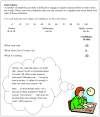The confounded self-efficacy construct: conceptual analysis and recommendations for future research
- PMID: 25117692
- PMCID: PMC4326627
- DOI: 10.1080/17437199.2014.941998
The confounded self-efficacy construct: conceptual analysis and recommendations for future research
Abstract
Self-efficacy is central to health behaviour theories due to its robust predictive capabilities. In this paper, we present and review evidence for a self-efficacy-as-motivation argument in which standard self-efficacy questionnaires - i.e., ratings of whether participants 'can do' the target behaviour - reflect motivation rather than perceived capability. The potential implication is that associations between self-efficacy ratings (particularly those that employ a 'can do' operationalisation) and health-related behaviours simply indicate that people are likely to do what they are motivated to do. There is some empirical evidence for the self-efficacy-as-motivation argument, with three studies demonstrating causal effects of outcome expectancy on subsequent self-efficacy ratings. Three additional studies show that - consistent with the self-efficacy-as-motivation argument - controlling for motivation by adding the phrase 'if you wanted to' to the end of self-efficacy items decreases associations between self-efficacy ratings and motivation. Likewise, a qualitative study using a thought-listing procedure demonstrates that self-efficacy ratings have motivational antecedents. The available evidence suggests that the self-efficacy-as-motivation argument is viable, although more research is needed. Meanwhile, we recommend that researchers look beyond self-efficacy to identify the many and diverse sources of motivation for health-related behaviours.
Keywords: health behaviour theory; motivation; outcome expectancy; perceived capability; self-efficacy.
Figures


Comment in
-
The world is confounded: a comment on Williams and Rhodes (2016).Health Psychol Rev. 2016 Jun;10(2):133-5. doi: 10.1080/17437199.2016.1162667. Epub 2016 Mar 22. Health Psychol Rev. 2016. PMID: 26948664 No abstract available.
-
Disentangling motivation from self-efficacy: implications for measurement, theory-development, and intervention.Health Psychol Rev. 2016 Jun;10(2):129-32. doi: 10.1080/17437199.2016.1162666. Epub 2016 Mar 30. Health Psychol Rev. 2016. PMID: 26953186 No abstract available.
-
Building better boxes for theories of health behavior: a comment on Williams and Rhodes (2016).Health Psychol Rev. 2016 Jun;10(2):136-9. doi: 10.1080/17437199.2016.1162668. Epub 2016 Apr 8. Health Psychol Rev. 2016. PMID: 26956171 No abstract available.
-
Self-efficacy: skip the main factor paradigm! A comment on Williams and Rhodes (2016).Health Psychol Rev. 2016 Jun;10(2):140-3. doi: 10.1080/17437199.2016.1163234. Epub 2016 Apr 8. Health Psychol Rev. 2016. PMID: 27055362 No abstract available.
References
-
- Ajzen I. From intentions to actions: A theory of planned behaviour. In: Kuhl J, Beckmann J, editors. Action control: From cognition to behaviour. New York: Springer; 1985. pp. 11–39.
Publication types
MeSH terms
Grants and funding
LinkOut - more resources
Full Text Sources
Other Literature Sources
